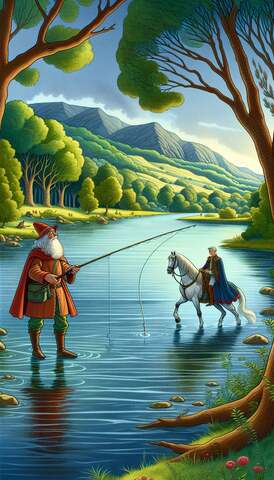
商朝末代皇帝纣王,因为宠爱妲己,不听忠臣的建议,残暴不仁,滥杀百姓,荒废国家大事。
姜子牙精通兵法和阴阳数术,受到纣王的赏识,并被封为司户参军。
但当他知道纣王的所作所为后,决定离开这个暴君。
姜子牙向西逃走,路上听说西伯侯(后来的周文王)有仁德、爱护百姓,并且广纳贤士。
于是,他决定到西伯侯管辖的地方隐居,并在渭河边当钓翁,等待机会寻找明君。
为了等待时机,辅佐贤君,姜子牙每天都在磻溪旁垂钓。
他用直钩钓鱼,钩上不挂香饵,也不把钩沉入水里,而是离开水面三尺高。
他还自言自语地说:“不想活命的鱼儿,愿意的话,就自己上钩吧!”
过了好几年,姜子牙还在磻溪岸边,手拿钓竿叹息道:“我已经八十岁了,还没遇到可以辅佐的明君。我在这里不是为了钓鱼,而是想找到一位贤明的君主。”
有一天,姜子牙在溪边遇见了一个樵夫武吉。
他算出武吉会有麻烦,就用阴阳数术教他如何避难。
武吉不仅骗过了西伯侯,还逃过了一劫。
西伯侯得知是姜子牙帮武吉躲过一劫后,觉得他是一个奇人,决定亲自去找他。
姜子牙想要试探西伯侯是否真的求才若渴,所以对来访的西伯侯一直不理不睬。
但西伯侯为了表明自己的诚意,每次来都更加恭敬,甚至吃三天素并清净身体,离姜子牙住处一公里远便下车步行。
到了第三次,姜子牙终于被西伯侯感动,两人见面并交换治国理念。
他们交谈非常契合,姜子牙决定为西伯侯效力,辅佐他兴邦立国。
西伯侯也知道了姜子牙的才能,尊封他为太公。
后来,姜子牙辅佐文王和武王,灭了商纣,建立了中国历史上国运最长的周朝。
“太公钓鱼”这句成语就是源于此,比喻有意愿的人会主动上门。
At the end of the Shang Dynasty, Emperor Zhou, because of his love for Daji, did not listen to the advice of loyal officials. He was cruel and ruthless, killing innocent people and neglecting state affairs.
Jiang Ziya was proficient in military tactics and yin-yang numerology, which won him the favor of Emperor Zhou and he was appointed as a captain of the household division.
But when he learned of what Emperor Zhou had done, he decided to leave this tyrant.
Jiang Ziya fled westward. On the way, he heard that King Xibo (later known as King Wen of Zhou) was benevolent, loved the people, and welcomed talented people.
So, he decided to live in seclusion in the area governed by King Xibo and became a fisherman by the Wei River, waiting for an opportunity to find a wise king.
To wait for the right moment to assist a wise king, Jiang Ziya fished every day by the side of the Panxi Creek.
He used a straight hook to fish, without any bait on the hook, and did not sink the hook into the water, but kept it three feet above the surface.
He also said to himself, "Fish that do not want to live, if you wish, come up and get hooked yourself!"
After several years, Jiang Ziya was still by the shore of the Panxi Creek, holding his fishing rod and sighing, "I am already eighty years old and have not yet met a wise king I can assist. I am not here to fish, but to find a virtuous and wise monarch."
One day, Jiang Ziya met a woodcutter named Wuji by the stream.
He calculated that Wuji would encounter trouble and taught him how to avoid danger using yin-yang numerology.
Not only did Wuji deceive King Xibo, but he also escaped disaster.
When King Xibo learned that it was Jiang Ziya who helped Wuji escape, he thought he was a remarkable person and decided to go and find him personally.
Jiang Ziya wanted to test whether King Xibo was truly eager for talent, so he ignored the visiting King Xibo all along.
But to show his sincerity, King Xibo became more and more respectful each time he came. He even fasted for three days, purified his body, and walked the last kilometer from where he got off the carriage to where Jiang Ziya lived.
On the third visit, Jiang Ziya was finally moved by King Xibo, and they met and exchanged ideas on governing the country.
Their conversation was very harmonious, and Jiang Ziya decided to serve King Xibo and help him establish a prosperous and powerful nation.
King Xibo also recognized Jiang Ziya's talents and respectfully granted him the title of Grandfather.
Later, Jiang Ziya assisted King Wen and King Wu, overthrowing the Shang Dynasty and establishing the Zhou Dynasty, which had the longest reign in Chinese history.
The idiom 'Grandfather Fishing' comes from this story, symbolizing that those who are willing will come forward voluntarily.